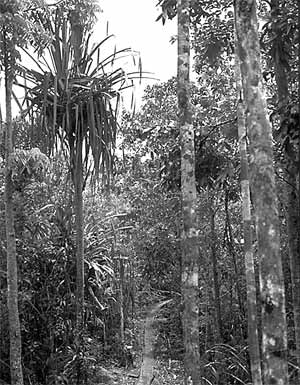


The Asia-Pacific Forestry Commission meets every two years to discuss policy issues, develop mechanisms for regional and subregional cooperation and to advise FAO on policy formulation and priorities for its forestry programme in the region.
A total of 122 delegates from 29 member countries of the commission and representatives of seven international organizations and five international non-governmental organizations gathered in Nadi, Fiji from 19 to 23 April 2004 for the twentieth session of the commission.
Reviewing the state of forestry in the region, the commission concluded that a number of factors were resulting in progress towards sustainable forest management: reorientation of policies, decentralization and devolution of forest management, application of best management practices and codes of practice for forest harvesting, expansion of protected areas, acceleration of plantation development and rehabilitation of degraded areas. Several countries reported that deforestation had been curbed or even reversed, although the loss and degradation of natural forests were still reported to be widespread. Countries generally reported increased use of criteria and indicators for sustainable forest management, certification, reduced-impact logging and participatory approaches in forest management.
The commission expressed concern over declining investments in the forest sector, and urged FAO to explore new avenues for obtaining finance for sustainable forest management, including partnerships with the private sector.
At this year’s meeting, the commission endorsed the establishment of the Asia-Pacific Forest Invasive Species Network, the first of its kind in the world – see page 43 of this issue for details.
As part of a worldwide effort to tackle the problem of forest fires, the commission encouraged member countries and FAO to intensify regional collaboration in combating and preventing forest fires, and requested FAO to examine the potential strengths and weaknesses of regional and global agreements on forest fires, including the feasibility of developing and implementing a global agreement on forest fire.
Delegates reported increased regional and bilateral cooperation in addressing illegal activities in the forest sector, and recommended further collaboration among member countries in dealing with these problems.
The conservation of biological resources, effective watershed management and the implementation of national forest programmes were among other topics discussed.
 |
FAO/FO-0504/C. PALMBERG-LERCHE |
Forty-eight representatives from 19 member countries gathered in Beirut, Lebanon from 24 to 27 May 2004 at the sixteenth session of the Near East Forestry Commission to discuss progress made in forestry in the region, FAO field programmes, the role of forests in food and water security and forest fires, among other subjects. Participants also included observers from non-member countries, United Nations agencies and intergovernmental and non-governmental organizations.
The commission noted an appreciable increase in forest and tree plantation – and particularly in urban and peri-urban planting – in several member countries as a result of the rising awareness of the importance of forests, increased political will and the availability of treated wastewater. Participants stressed the importance of information exchange on the successful implementation of reforestation and sustainable forest management activities.
The commission discussed the pressures and threats facing forests and trees outside forests in the region, including overgrazing, forest fires and exotic invasive species. Delegates pointed out the need for holistic planning and more empowered forestry institutions with capable, well-trained personnel to meet the challenges. The commission stressed the importance of collaborative action in facing forest threats and recommended that thematic studies be conducted on problems common to the countries of the region. Areas of potential mutual interest include integrated regulation of the use of forest and range resources to achieve the sustainability of both; and the negative impacts of forest invasive species, which might be addressed through the establishment of regional information networks.
The commission noted the successful completion of the first FAO technical cooperation project on mangroves in the region, and emphasized the importance of support to mangrove forests.
Attention was drawn to the need to develop better methods for economic and monetary valuation of forest goods and services to measure the contribution of forestry to national economies and to raise the sector’s profile in national budget allocations.
The delegates pointed out the need for further study of the role of forests and trees in watershed areas and along watercourses in regulating water flow and water quality. They also recommended that attention be devoted to the socio-economic linkages between highlands and lowlands and the impact of mountain tourism on water resources.
The commission recognized the validity of developing bilateral and regional agreements for combating wildfires and recommended that the subject be considered at the seventeenth session of the Committee on Forestry in 2005.
The commission meets biennially.
In the Gambia, the concept of community forestry – involving the transfer of ownership of forest land from the government to communities – was first introduced in the mid-1980s, and the country’s first community forests were established in 1990. The government recognized, however, that community forest management can only be effective if there is sufficient incentive for communities to invest in the conservation of forest resources; and that communities that had obtained ownership and authority over the forests would need to obtain long-term financial benefits.
In late 2000, the Forestry Department of the Gambia identified FAO’s Market Analysis and Development methodology as a potential tool for assisting communities with income generation from forest products. The approach is based on a three-phase process:
The Gambian Forestry Department first implemented the approach in a pilot area in the Western Division in 2001. The communities carried out market surveys, identified the most promising products and prepared enterprise development plans for them.
The market surveys showed that several forest products were imported into the Gambia from surrounding countries when they could instead be harvested, processed and marketed locally in a profitable and sustainable way. The Gambian Forestry Department, however, lacked the capacity and financial resources to support community-based forest enterprises on a national scale and requested FAO support.
In response to this request, the FAO project “Capacity Building in Community-Based Forest Enterprise Development” was launched in March 2003. Its main objective was to build the capacity of the Gambian Forestry Department to establish viable community-based enterprises that would contribute to improved livelihoods of the rural population and create incentives for sustainable management of community forests in the country.
Market analysis is now being incorporated into the Gambian Forestry Department’s policy for participatory forest management at all levels. A Market Analysis and Development training package has been included in the curricula of technical forestry schools. A successful community-based enterprise will be documented audiovisually and in writing for wide dissemination. FAO is also assisting the Forestry Department in identifying funding sources and developing funding proposals for wider market analysis in the Gambia. The project will end in October 2004.
Sustainable development and the alleviation of poverty in mountain regions can be fostered by creating new income-generating activities that will conserve the mountain environment, ensure equity and promote the well-being of mountain communities.
To help increase understanding of the conditions for self-sufficient and diversified mountain economies in which people receive fair compensation for the goods and services they produce, FAO conducted a study of income-generating activities in mountainous regions of Africa, Latin America, North America, Europe and Asia. The study was carried out from September 2003 to April 2004 with the collaboration of regional institutions: the Mountain Institute (TMI), the International Potato Center (CIP), the Banff Centre, the International Centre for Integrated Mountain Development (ICIMOD), Euromontana and the World Agroforestry Centre (ICRAF). The research institutions carried out surveys through a written questionnaire and e-mail and telephone follow-up. One product or enterprise per region was highlighted in a case study.
The study revealed that economic factors contributing to the failure or success of mountain enterprises include good information flows between producers and consumers; identification of and capitalization on the unique attributes of a product; access of producers to credit and financing; product diversification; and effective packaging and promotion strategies.
Institutional factors cited were the existence of laws and policies that enable access and/or ownership of natural resources, which guarantees a sustainable supply of raw materials for production; the existence of fair trade organizations; subsidies and tax breaks; and alliances between producers and non-governmental organizations, local institutions, funding agencies, research centres, extension services and business development
providers.
Other factors identified as contributing to the success of a mountain enterprise include the natural resource endowment of the area, participatory approaches to developing small-scale enterprises, technology introduced progressively at the community level and compatible with the local environment and attention to quality standards.
The study’s recommendations include the development of training materials and tools for capacity building in small-scale enterprise development, and the development of a Web-based information system to disseminate information on successes and failures in mountain product initiatives.
 |
FAO/17435/A. ODOUL |
FAO seeks to integrate food and livelihood security issues into HIV/AIDS prevention, care and impact mitigation. Since forests and trees are integral components of agricultural systems and rural livelihoods, FAO is also developing a series of responses to enhance the role of forests in the coping strategies of AIDS-afflicted households and to address the impacts of HIV/AIDS on forestry institutions.
A 2003 study commissioned by FAO on the interface between natural woodlands and HIV/AIDS-affected communities in southern Africa produced the following findings (among others).
On 1 April 2004, FAO, with support from the Southern African Development Community (SADC) and the Finnish International Development Agency (FINNIDA), held a regional seminar in Harare, Zimbabwe to discuss the key findings of the miombo woodlands study. The aim was to facilitate discussion on the capacity of the forest sector to address the pandemic more effectively and on the potential role of the sector in contributing to multisectoral HIV/AIDS programming.
The seminar brought together key actors in the forest and wildlife sectors in southern Africa including representatives from the forestry departments or affiliated SADC programmes of Malawi, Mozambique, the United Republic of Tanzania, Zambia and Zimbabwe. Nationals from Kenya, Uganda and the United Republic of Tanzania represented various non-governmental organizations.
Participants recommended that forest departments and partners in the forest sector consider the following priorities:
Thirty-eight representatives from 18 countries participated in the forty-fifth session of FAO’s Advisory Committee on Paper and Wood Products from 17 to 18 April 2004 in Canberra, Australia. The main functions of the committee are to advise FAO on activities related to forest industries, to promote sustainable forestry development in developed and developing countries and to verify relevant statistical information prepared by FAO and ensure its usefulness. The committee meets annually.
At this year’s meeting, the following areas were highlighted for FAO attention:
The committee also recommended continued strengthening of the collaboration between FAO and ICFPA.